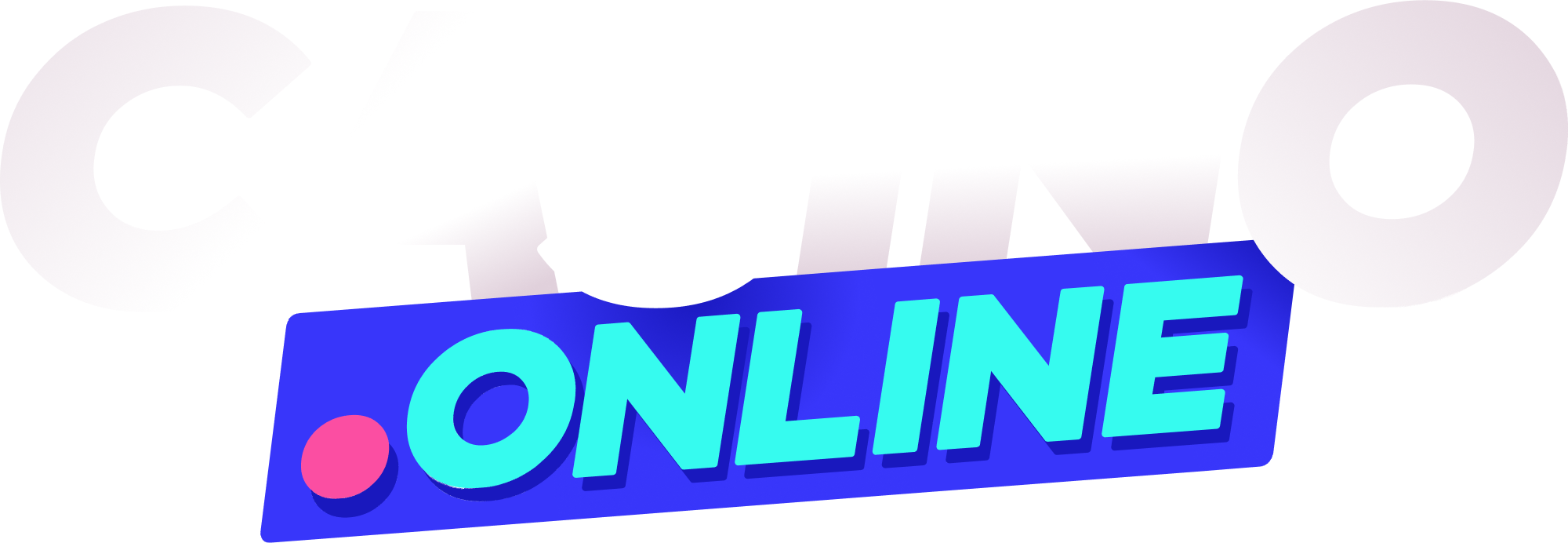
Casino Gambling Addiction: How to Recognise, Prevent, and Seek Help
Article by
Updated by Jacob Evans Feb 13, 2026
Casino gambling addiction is something I've witnessed up close, and it's an issue that sits at the heart of my work in this industry. With casinos and online games always within reach, I see how easily the lines between entertainment and genuine risk can blur.
That's why I believe it's crucial to understand what casino gambling addiction really looks like, how it can impact our lives, and what we can all do to protect ourselves and others. In this guide, I'm sharing hard-earned insights and practical advice to help you recognise the warning signs early, steer clear of common traps, and, most importantly, find reliable support if you or someone you care about ever needs it.
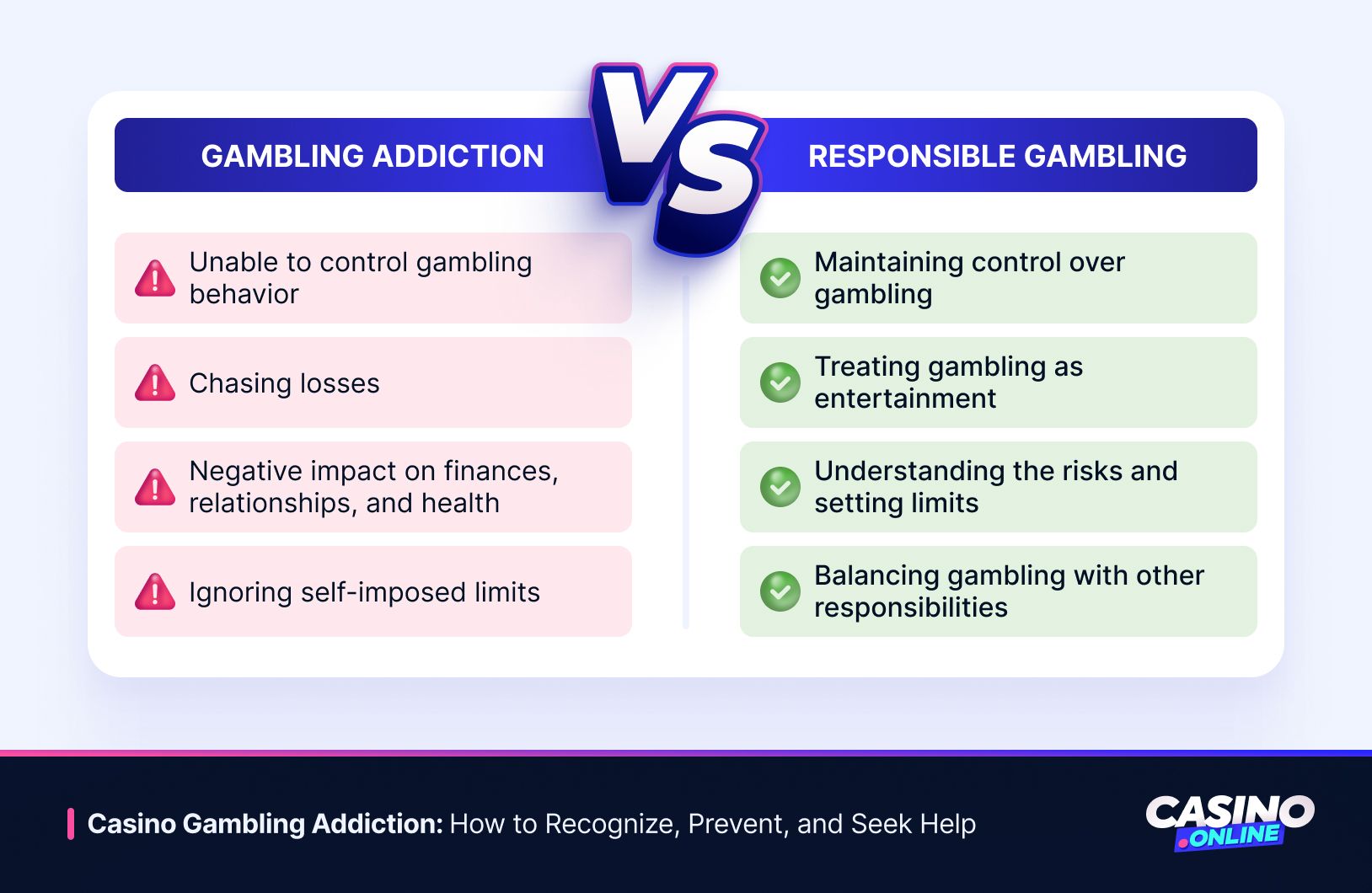
Why This Topic Matters - And Why I'm Writing About It
Let me be clear: I love this industry. I've seen the excitement, the innovation, the booming entertainment value. But I've also seen the darker side, players getting in over their heads, unable to stop chasing losses, hiding behaviour from loved ones.
That's the point of this article. I'm not here to sound alarms; I've seen how things can spiral fast. Whether you're playing or managing a platform, noticing the warning signs early can be the difference between damage control and disaster. If this industry's going to have any future, it's not just about launching flashier games, it's about looking out for the folks playing them.
You can expect our blog to keep expanding, with in‑depth follow‑up articles on Casino Gambling Addiction and other important topics that shine a light on responsible gaming and player wellbeing.
What Is Gambling Addiction, Really?
So, here's what folks get wrong: Gambling addiction isn't this thing you "decide" to have. You don't wake up and say, "Today, I'll become hooked." Your brain? It's just after that next jolt, dopamine hit, same as with a cold beer after work or, I don't know, a bit too much sugar. Won big, lost even more… it's all the same patch of brain lighting up. Science backs that up, too. A big win at the slots? Feels almost identical, chemically speaking, to a hit of something stronger. And when someone loses control of their play, the consequences are real, financially, emotionally, and socially.
The tough bit is how quickly "just for fun" morphs into "just to feel normal." I've seen bank accounts gutted, friends go quiet, relationships crumble, straight up, it's ugly. Told myself it wouldn't happen to me. (It didn't… so far.)
When a colleague worked with a mid-size European operator, he once received a frantic support ticket from a player's spouse. They'd just discovered a five-figure loss on their joint account. It was a gut-punch reminder: behind every deposit is a person, and often a family.
Clinically speaking, yep, gambling disorder sits in the same category as drug and alcohol addictions. That's not just a technicality.
Gambling addiction can sneak into anyone's life, no matter where you're from or what you do.
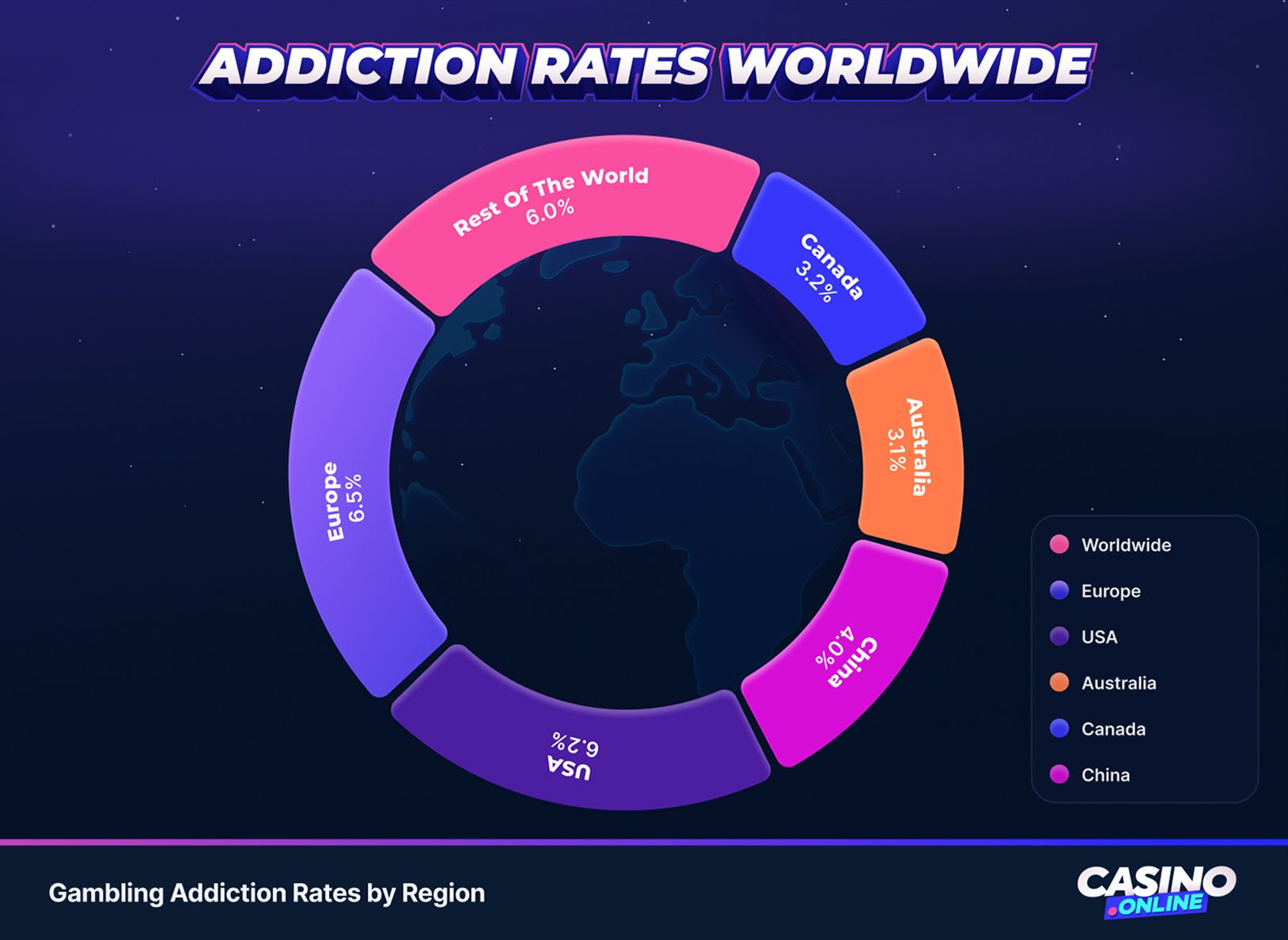
Gambling Addiction Rates in Europe and Worldwide
Gambling addiction can creep in quietly and catch just about anyone off guard, no matter where they're from or how they live. Across Europe, the numbers can look pretty different depending on where you are. Some countries have less than 1% of people struggling, while others - especially among younger folks - see rates that are hard to ignore. Step out of Europe, and things don't get any simpler. In some places, about 6 in every 100 folks are caught up in gambling problems; that's no small bump in the road, it's a full-blown rough patch.
These numbers aren't just numbers. They tell you how culture, local rules, and day-to-day struggles shape how gambling takes hold. You can't just throw the same quick fix at every place and expect it to stick.
To really help, you've got to know the lay of the land, understand the scars folks carry, and gear your support like you're heading into a proper battle - right there where they live it.
Common Signs of Gambling Addiction
Spotting addiction early can make all the difference. Here are some red flags I've seen, and that many support orgs agree on:
- Chasing losses (trying to win back money that's already gone)
- Lying to family or friends about gambling
- Hiding debts or maxing out credit cards
- Skipping work or social events to gamble
- Feeling anxious, irritable, or restless when not gambling
- Playing even when it's no longer fun - just necessary
Deepening the recognition: Emotional signs you can't ignore
Many gamblers battle demons that the rest of us never see, carrying emotional baggage that's heavier than any debt. I've watched friends go through this, and the shame hits differently than you'd expect - it's not just about the money lost, it's about feeling like you've let everyone down, including yourself.
That shame becomes a suffocating blanket that makes people want to disappear. I remember one colleague who'd frantically delete casino apps after every session, like wiping the evidence would somehow undo what happened. The cleared browsing histories, the sudden silence when money conversations came up at dinner - these aren't just habits; they're survival mechanisms for people drowning in their own guilt.
What breaks my heart is how isolated they become. When things get really bad, instead of calling for help, people just dig deeper trenches. I've watched this happen with a mate of mine. Every time the walls started closing in, he'd add another layer of secrecy rather than crack the door open for anyone who might actually give a damn.
It's mental, really. You'd think reaching the breaking point would push someone toward their support network, but it works the opposite way. They become master architects of isolation, constructing these intricate lies and cover-ups because somehow that feels less terrifying than having an honest conversation.
From where I sit, having covered this industry for years, I've heard countless stories that follow the same script. Someone's drowning, but they'll spend their last bit of energy making sure nobody knows they can't swim. The idea of watching someone they love realise the full extent of the damage - that look of disappointment or worry crossing their face - feels worse than just carrying the burden alone.
What's twisted is how backwards this thinking becomes. These are usually the same people who'd drop everything to help a friend in crisis, yet they can't imagine anyone would do the same for them. But here's what gets me: while they're protecting everyone else from their "failure," they're slowly poisoning themselves with stress.
That constant fear of discovery? It's exhausting. Your shoulders never relax, conversations become minefields, and you start second-guessing every interaction. I've watched people lose more sleep over hiding their gambling than they ever did from the actual losses. The money problems are bad enough, but living like you're some kind of criminal in your own life, that's what really breaks people down.
Look, if you're reading this and thinking "that's me," here's something worth considering: addiction isn't about being weak or broken. It's about your brain getting hijacked by something designed to be irresistible. And those people you're so worried about letting down? Nine times out of ten, they're more concerned about you than they are about being right or proving a point. Most folks just want their person back, not a perfect scorecard.
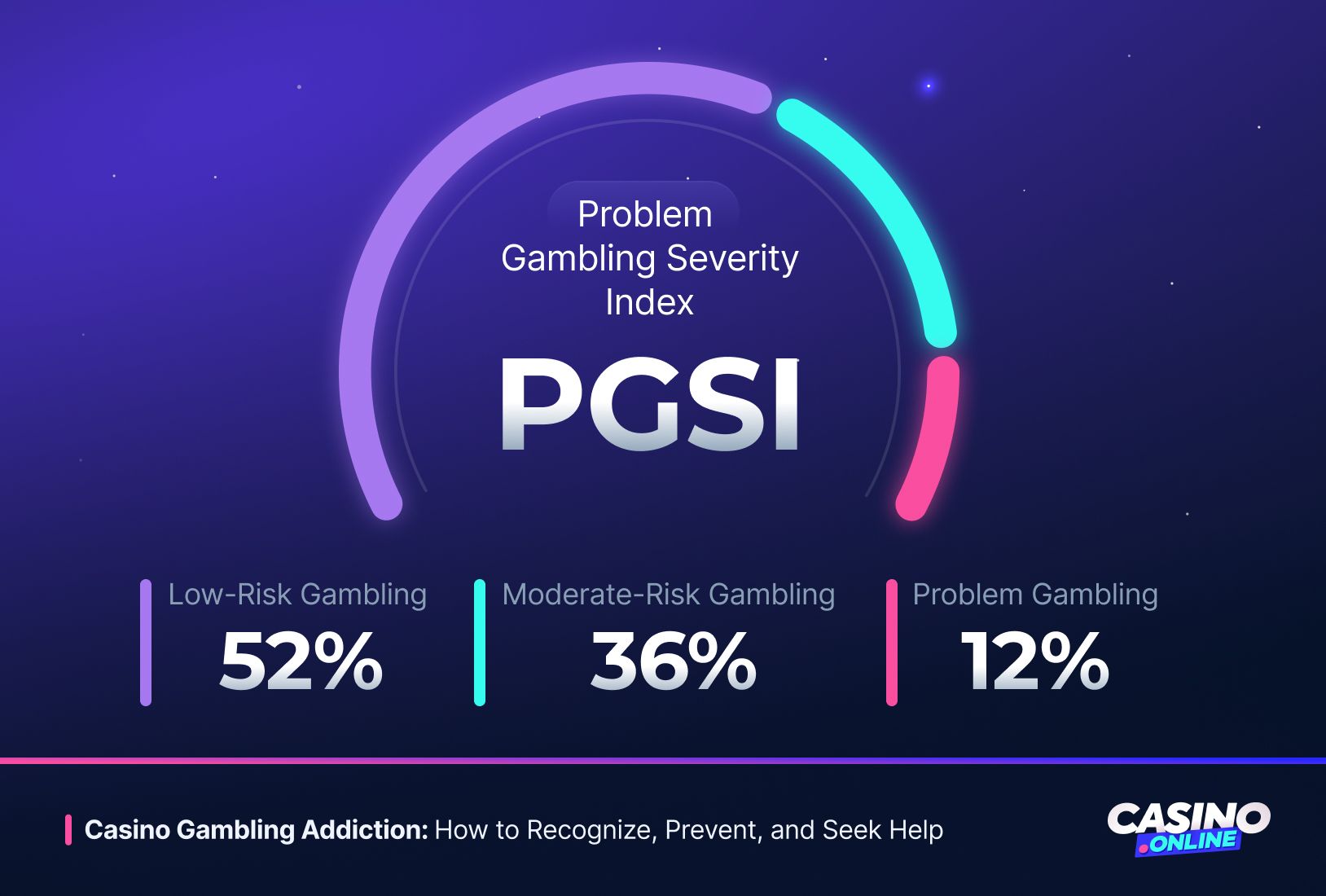
How to Gamble Responsibly - and Stay in Control
I've tested hundreds of platforms over the years, and the best ones don't just offer games - they offer guardrails. Here's what responsible gambling looks like in practice:
- Set deposit limits
- Use time reminders
- Take breaks and self-exclude
- Avoid chasing losses
For information on the above practical prevention tools, visit our Responsible Gambling page
Handy Resources
I've lined up some solid support services to help anyone wrestling with gambling issues. Whether you need down-to-earth advice, professional treatment, or straight facts, these folks will back you up through every step.
Treatment & recovery focus
Gambling addiction isn't a fight you win by sheer grit alone. It's about getting the right kind of help and taking steady steps forward. Here's the real deal on what works:
Therapy
Cognitive Behavioural Therapy (CBT) is often the toolkit's heavy hitter. It helps you spot and shake off those sneaky thoughts and habits that keep you stuck in the loop.
GamCare and the NHS are two places that offer solid CBT programs, whether one-on-one or group-based.
Support groups
Look, sometimes the best medicine is just knowing you're not the only one fighting the battle. Groups like Gamblers Anonymous or the online circles on Gambling Therapy are like your squad on the field. These are people who get it, they've seen the same rough terrain and know the pitfalls. You can drop the act, be straight with them, and lean on the crew when things get heavy.
They meet regularly, whether it's face-to-face or via a screen, so you always have someone watching your six, ready to back you up when the going gets messy.
Medication
There's no quick fix or magic pill for this. But sometimes, doctors hand out meds to tackle the backup problems that come with gambling - stuff like anxiety, low mood, or impulse control that can trip you up.
Think of these meds as part of your kit - not a solo weapon, but something to help keep you steady when the situation calls for it. Of course, meds work best when you're working with a good therapist and a healthcare pro who knows the terrain.

Opinion of Andrew Collins
“If you're thinking of reaching out, remember this: nobody expects you to be a lone ranger. With the right support team, you can take the reins again and steer your life back on course.”
Trusted support services
GamCare (UK)
GamCare provides confidential counseling, practical advice, and emotional support for those affected by problem gambling. Their National Gambling Helpline 24/7 assistance via phone, live chat, and email, plus peer support groups and online resources aimed at recovery and relapse prevention.
- National Gambling Helpline (24/7): 0808 8020 133
- WhatsApp: 020 3031 8881
- Email: info@gamcare.org.uk
- Website: www.gamcare.org.uk
- Office Address: 1st Floor, 91-94 Saffron Hill, London, EC1N 8QP
GambleAware (UK)
GambleAware is an independent charity funding research, education, and treatment services for gambling harms. They commission evidence-based programs, public awareness campaigns, and self-assessment tools, while directing individuals towards accredited treatment providers to ensure timely intervention and support.
- Phone: 020 7287 1994
- Email: info@gambleaware.org
- Address: 5th Floor, Lincoln House, 296-302 High Holborn, London

Gambling Therapy (Global)
Gambling Therapy offers free, multilingual support for anyone affected by gambling problems worldwide. Services include around-the-clock live chat, email counseling, online peer support forums, and self-help resources, all moderated by trained counselors to ensure safe, stigma-free recovery pathways.
- Website with live chat, email support, and forums: www.gamblingtherapy.org
National Council on Problem Gambling (US)
The National Council on Problem Gambling operates the National Problem Gambling Helpline, connecting callers to local treatment services. It advocates for public policy reform, funds research, and engages in professional training to reduce stigma and improve access to prevention and treatment.
- Phone: 202-547-9204
- Email: ncpg@ncpgambling.org
- Address: 730 11th Street, NW, Suite 601, Washington, DC 20001

NHS (UK)
The NHS provides free, evidence-based treatment for gambling disorder through local Improving Access to Psychological Therapies (IAPT) services and specialist community clinics. Interventions include cognitive behavioral therapy, motivational interviewing, and group therapy, integrated within the broader mental health care system.
- Local service contact varies; general enquiries can be made through NHS 111
- Example: Southern Gambling Service email: SouthernGamblingService@southernhealth.nhs.uk

American Psychiatric Association
The American Psychiatric Association publishes diagnostic guidelines for gambling disorder in the DSM-5 and offers continuing education for clinicians. Its resources support research, advocacy, and clinical best practices to improve diagnosis, treatment, and understanding of behavioral addictions.
- Phone: (800) 374-2721 or (202) 336-5500
- Address: 750 First Street, NE, Washington, DC 20002-4242
- Website contact: www.psychiatry.org/about/contact
Take care of yourself, even if you think you don't need help just yet. Early action opens doors and builds a stronger foundation for recovery.
What to Do If You Need Help
Let's say you're past the point of casual play. You're stressed. You're hiding your gambling. You want to stop, but can't.

Opinion of Andrew Collins
“You are not alone. And you're not powerless, either.”
Reach out to support services
Here are trusted, confidential organizations that can help, whether you're a player or a loved one:
- GamCare (UK) - gamcare.org.uk Tel. 0808 8020 133
- Gambling Therapy - gamblingtherapy.org
Multilingual online support including live chat and email counseling. - National Council on Problem Gambling (US) - ncpgambling.org
Tel. 1-800-GAMBLER (1-800-426-2537)
24/7 help for gambling problems in the US. - BeGambleAware (UK) - begambleaware.org
Tel. 0808 8020 133
Funding treatment and support services across Great Britain.
European Union Local Hotlines:
- Gambling Care (Ireland) - gamblingcare.ie
Tel. 1800 936 725 (ROI) / 08000 886 725 (NI)
Confidential support with free counseling and peer groups. - Gamblers Anonymous (UK & Ireland) - gamblersanonymous.org.uk
Tel. 0330 094 0322
Peer-led 12-step support and group meetings. - Gamblers Anonymous Spain
Local branches with phone and face-to-face support. - France - Joueurs Info Service
Tel. 09 74 75 13 13
Free, confidential helpline for gamblers and families. - Germany - Bundeszentrale für gesundheitliche Aufklärung (BZgA)
Tel. 0800 137 27 00
National gambling help hotline, offering counseling and referrals. - Italy - Gioca Responsabile
Website provides region-specific help numbers for gambling addiction support.
These services offer confidential helplines, live chats, therapy referrals, and group support - always judgment-free and experienced in understanding the challenges of gambling addiction. If you or someone you know is struggling, reaching out is the first step toward taking control.
Talk to someone you trust
Talk to One Real Person: Doesn't have to be a parent or partner, even just a mate who's seen it. The relief in "getting it out there" is wild. Isolation fuels addiction. Connection helps end it.
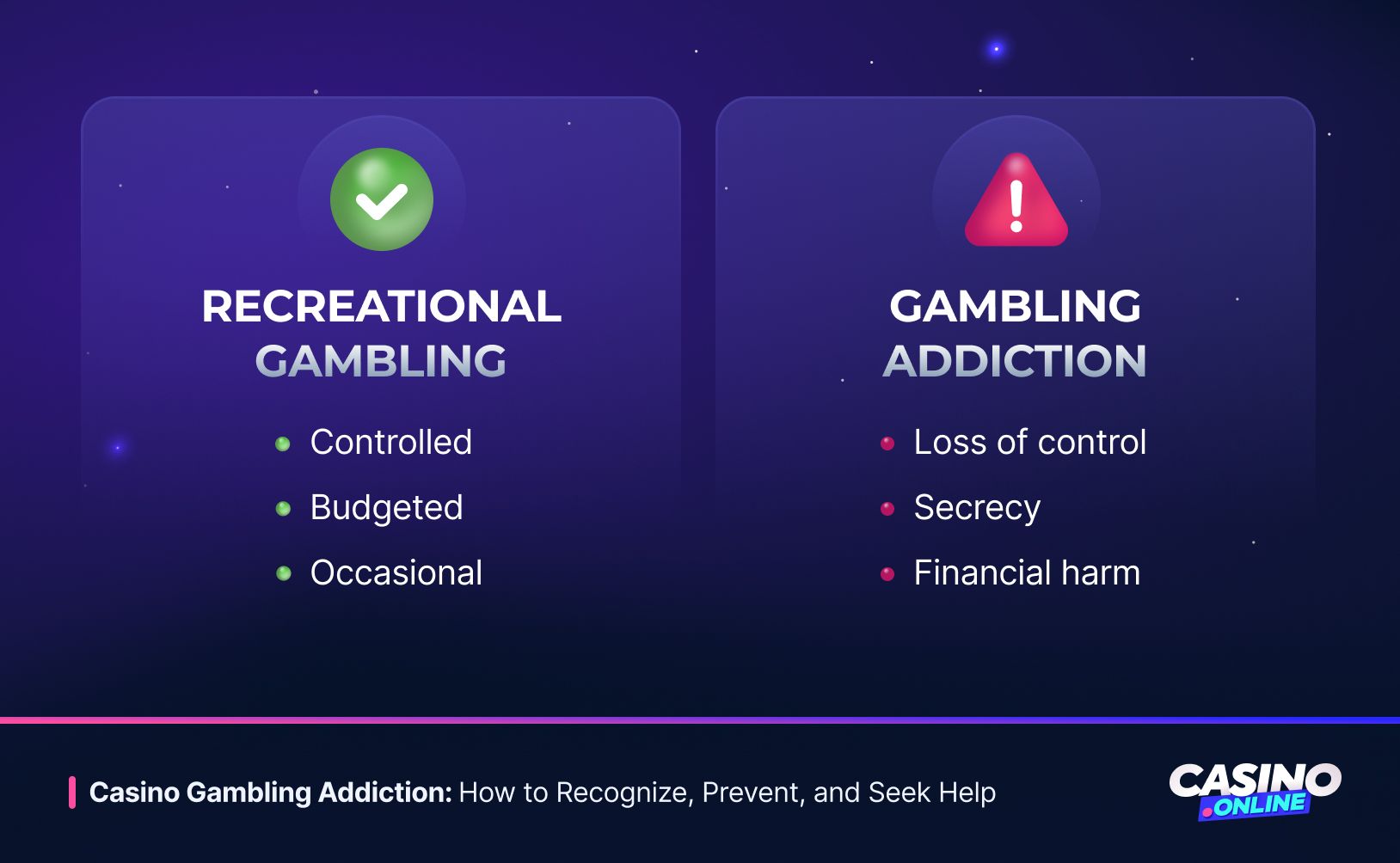
Helping Someone Else? Here's How
If someone you care about is showing signs of gambling addiction, don't go in guns blazing. It's a sensitive topic, and shame is already doing half the damage.
Here's what you can do:
- Ask how they're doing without cornering them
- Express concern with kindness, not judgment
- Offer a hand, not a lecture. Point them toward support. And protect your own finances and mental space while you're at it.

Opinion of Andrew Collins
“I once had a friend who kept asking to borrow 'just a bit' of money after poker losses. I finally asked him straight up if he needed help. It was uncomfortable, but it was also the start of his recovery.”
Gambling and Mental Health: A Vicious Cycle
Nobody really mentions this, but most folks I've seen caught in it aren't just dealing with bets; there's stress, insomnia, anxiety, sometimes deeper stuff they don't want to face head-on. Sometimes, gambling is the way to avoid feeling that mess, which then makes it worse, a horrible loop.
You can't just unplug the behaviour and call it a day. Real recovery means looking at the full picture: the person, their stress, their coping tools, and their money situation. Whether it's therapy, medication, or sorting out finances, they all help piece things back together.
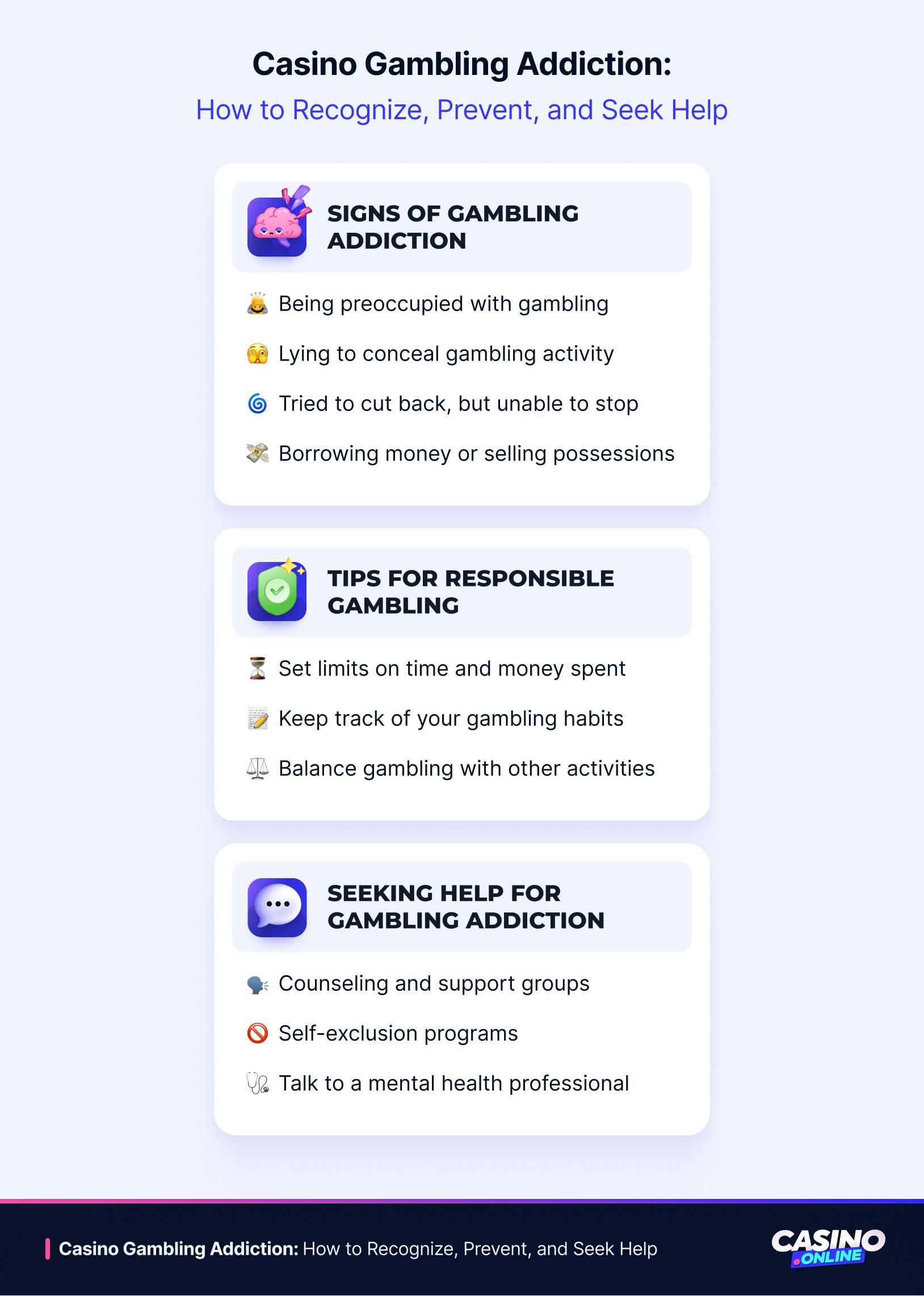
Final Word: It's Just a Game - Until It's Not
I've spent years writing about online casinos. I've praised bonuses, critiqued payout speeds, and explored the thrill of the spin. But I'll say this, honestly and firmly:

Opinion of Andrew Collins
“No promo or payout is worth wrecking your sleep, your savings, or your marriage. Simple as that.”
If something in you says, "I need to hit pause," don't ignore it. You don't have to quit overnight, but it's time to take the wheel.
Gambling should be entertainment. If it becomes survival, escape, or a compulsion, that's your sign to get help.
And if you run a casino or work in the industry? It's your responsibility too. Build systems that protect players. Make self-exclusion easy. Flag harmful behaviour. Be part of the solution.

Opinion of Andrew Collins
“At the end of the day, this industry isn't about code or credit cards - it's about people. Real ones. And they deserve to feel safe.”
FAQ: Real Questions I Hear (and Sometimes Think) About Gambling & Addiction
I'm not sure if I actually have a gambling problem. How do people usually figure that out?
Honestly, nobody wakes up and says, "Whoa, I'm addicted now." It kind of creeps up on you. For me, I always tell people: if you're losing track of time, hiding your balance, getting weird about money, or, I don't know, feeling jumpy when you're not playing, that's a flag. Sometimes it's as simple as a gut feeling that things are off. If you've already got that little voice telling you to take a break, it's worth listening to.
My mate says I just have bad luck. Is that the same as addiction?
Ah, the old "bad luck" excuse, been there. No, not quite. Bad luck is when you lose a few hands and walk away, a bit annoyed, maybe. Addiction is where you can't walk away, even when you know you should, and it keeps costing you (in money, time, or, honestly, sanity). If you keep pushing for a win you tell yourself is just around the corner, yeah, it might not just be luck.
Can I just sort this myself? Or do I need someone?
Some people manage on their own, I think, especially in the early stages. Things like self-bans and telling a friend can make a HUGE difference (way more than most want to admit). But, speaking for myself and a few close to me, sometimes you get deep enough that you need a hand. If you try for a while and keep ending up back at the tables? No shame in getting extra help, therapists or support groups, whatever works.
Is there actually someone I can talk to who won't judge me?
100%. There are helplines, live chats, and group meetings, and, this surprised me, they're mostly just regular folks who've seen everything. Try GamCare, Gambling Therapy, or, if you're in the US, the National Council on Problem Gambling. You can even use a fake name if you're wobbly about privacy. You're probably not even their weirdest story this week.
How do I help someone I care about who's deep in this?
That's tough. I wish there were a "one-size-fits-all" script, but it's messy. Best advice? Be gentle, don't blame, and just start with "Hey, I'm worried. What's up?" Listen, don't interrogate. If things get heated, take a breather and come back to it later. And, really, look after yourself too. It's easy to get dragged down trying to fix someone else.
Are online casinos more risky than regular ones?
In some ways, yeah, they're open 24/7 and literally in your pocket. But, funny enough, some online places give you tools to set limits or take a break, which your local corner shop probably won't. Still, if you find yourself reaching for your phone first thing every morning, that's maybe a sign it's got its claws in.
Can you ever "fully" recover, or is this a thing you always have?
Fair question. From what I've seen (and a few mates who've been through it), you can absolutely get your life back, but that urge sometimes pops up again, even years later. It's sort of like being allergic to something; you learn what sets you off, and you avoid it, but you always keep an eye out. Doesn't mean you're doomed.
Does self-exclusion even work? I feel like I could just find another site.
Good point, we're all pretty clever when we want to gamble again! But the real benefit is that it cuts friction and forces you to stop, at least on legit sites. The urge might stick around, but if you lock yourself out of the big ones, it's at least a hurdle. From what people tell me, sometimes that's just enough time to shake it off.
Honestly, what should I do if I feel like things are too much right this second?
If it feels like it's all crashing down? Just… pause. Get off the app or leave the place, hit up a friend (even if you feel weird), or call a helpline. There's zero shame in admitting you need a breather. Even just telling someone "today's rough" is a massive first step, a bigger one than you probably realise.
References
American Psychiatric Association. (May 2, 2024). What is Gambling Disorder?. American Psychiatric Association.
Gambling Commission. (October 18, 2024). Organisations that can help. Gambling Commission.
NHS. (December 8, 2023). Help for problems with gambling. NHS.
GamCare. Self-Guided Resources. GamCare.
gambleaware.org. However gambling is making you feel right now, we can help. gambleaware.org.
gamblingtherapy.org. Providing online help for people experiencing gambling harm. gamblingtherapy.org.
ncpgambling.org. Help for Problem Gambling - Help by State. ncpgambling.org.

Written by
Andrew Collins
Author
I've spent over nine years at five leading iGaming firms - and long before that, I was emptying slots and balancing takings since 1992. From diving deep into slots and unearthing hidden betting strategies, I deliver witty, actionable advice that even seasoned bettors appreciate. Ready to elevate your play with me and casino.online? Let's get started!

Facts checked by
Jacob Evans
Content Writer & Casino Specialist
I'm Jacob Evans, your go-to expert in online gambling. With a robust background in casino gaming and a knack for breaking down complex betting strategies, I'm here to guide you through online casinos, sharing tips to help novices and seasoned bettors excel.
